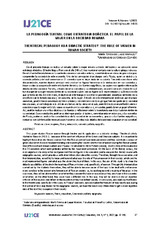La pedagogía teatral como estrategia didáctica: el papel de la mujer en la sociedad romana
Theatrical pedagogy as a didactic strategy: the role of women in Roman society
Autor
Luque Morales, María Teresa de
Editor
Universidad de Córdoba, UCOPressFecha
2022Materia
MujeresRoma
Educación
Epigrafía
Women
Education
Comedia palliata
Commedia palliata
Epigraphy
METS:
Mostrar el registro METSPREMIS:
Mostrar el registro PREMISMetadatos
Mostrar el registro completo del ítemResumen
En el presente trabajo se realiza un estudio sobre la mujer romana a través del teatro y su aplicación como estrategia didáctica. El teatro llega a Roma en el año 240 a.C. tras mantener contacto con la cultura griega y etrusca. De esta fuente literaria tenemos la suerte de conservar comedias enteras, convirtiéndose en obras de gran valor para comprender la sociedad de este momento. Uno de los principales dramaturgos sería Plauto, quien se dedicó a la comedia palliata y del cual conservamos 21 comedias que no dejan duda de su autoría. Tomando como base esta documentación, nuestro objetivo principal será analizar las figuras femeninas más destacadas en sus comedias y llevar a cabo la comparación entre esta fuente literaria y las fuentes epigráficas, las cualesnos aportan información directa de esta sociedad. Por ello, a través de estas comedias y su interpretación, se podrá conocer y transmitir cuál fue el papel de la mujer romana dentro de su sociedad: cuáles son las figuras más representadas y cuál era la visión que se tenía de ella. De este modo, el objetivo de este trabajo es mostrar las posibilidades didácticas del teatro en la enseñanza de la historia romana y, en concreto, de la mujer. A través de esta interpretación realizada por el propio alumnado, podrán tomar conciencia del tema a tratar y sensibilizarse con la mujer que formaba parte de la sociedad romana pues, al ser trabajado más allá de una lectura de las obras en el aula, permitirá realizar una reflexión sobre si consideran que la mujer sería tal y como se muestra en las comedias o si, en cambio, podría tener un papel diferente. Así, podrán realizar una crítica objetiva a las fuentes y reflexionar sobre la importancia que éstas tuvieron dentro de su sociedad. Como conclusión, podríamos decir que gracias al teatro y, concretamente en este caso, a las comedias de Plauto, podemos analizar las características de la sociedad de su momento y, gracias a las fuentes epigráficas, contamos con la información necesaria para hacernos una idea más objetiva del papel que ocupaban en su sociedad. This paper studies Roman women through theatre and its application as a didactic strategy. Theatrical activity started in Rome in 240 B.C. because of the constant influence of the Greek and Etruscan cultures. It is important to highlight those dramatic literary sources from the Roman period have been preserved and they constitute a corpus of great value when it comes to understanding and exploring the society and the role of women during the Roman period. One of the most well-known authors was Plautus. He devoted his life to Palliata comedy,and it is relevant to emphasisethat 21 comedies which were probably written by him have been preserved. On the basis of this literary corpus, the main objective is to analyse the most prominent female figures in his comedies and to compare this literary source with epigraphic sources, which provide us with direct information about this society. Therefore, through these comedies and their interpretation, we will try to know and transmit what was the role of Roman women in their society: which are the most represented figures and what wasthe vision they had of them. In this way, the aim of this study is to show the didactic possibilities of theatre in the teaching of Roman history and, specifically, of women. Through this interpretation carried out by the students themselves, they will beable to become aware of the topic to be dealt with and become more sensitive to the women who formed part of Roman society, as, by working beyond a reading of the plays in the classroom, they will be able to reflect on whether they consider that women would be as they are shown in the comedies or whether, on the other hand, they could have a different role. In this way, they will be able to make an objective criticism of the sources and reflect on the importance they had in their society. In conclusion, wecould say that thanks to the theatre and, specifically in this case, to Plautus' comedies, we can explore the features of how society was during that period of time and, thanks to the epigraphic sources, we have the necessary information to get a more objective idea of the role they occupied in their society.

